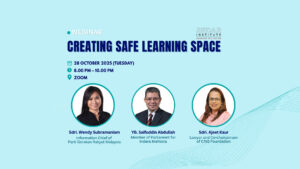
Author
Dr. Lau Zhe Wei
The neutrality of the Dewan Rakyat speaker is often questioned by opposition Members of Parliament, who see the speaker as inclined to favour the government. As the country has witnessed multiple changes of government, this is true regardless of which party or coalition sits on the opposition bench. Such a notion can hardly be disputed as all the speakers are practically appointed by the government of the day and many of them retain interests within the bounds of Malaysian political exchanges. If that is indeed the case, would any speaker of the Dewan Rakyat be able to really be neutral or at least seen to be neutral not only in the eyes of the opposition bench, but also the public?
The Dewan Rakyat speaker and conflict of interest
The perception of the speaker’s neutrality depends on whether he has gained public confidence, which correlates to the question of whether or not he is free from conflict of interest. The threshold for conflict of interest for the position of the speaker should be high and it should cover not only personal direct interest, but anything that could possibly influence or be seen to influence his decision making. Hence, reducing the magnitude of conflict of interest of the speaker may enhance the confidence of the opposition bench as well as the public.
The Dewan has seen the appointment of four speakers since the twelfth general election (GE) in 2008, which heralded shifts in the federal government power configuration. The first was Pandikar Amin Mulia, from 2008 until before the fourteenth GE in 2018, followed by Mohamad Ariff Md Yusof after Pakatan Harapan won the 2018 GE until the Sheraton Move in 2020 when Azhar Azizan Harun appointed, and the latest being Johari Abdul after the 2022 GE. In the eyes of the opposition benches during their respective tenures, each of them had their own conflicts of interest.
Although Pandikar Amin resigned as a division chief upon accepting the position as the speaker, he returned to active politics with UMNO after he was not re-nominated for the 2018 parliamentary term. Although Ariff Yusof resigned from all party positions, he remained a member of Amanah during his tenure as speaker. Azhar Harun, a non-politician, was seen with scepticism by the opposition, especially as his brother held the position of attorney general. Johari Abdul, although no longer active in PKR politics, has a son who serves on the government bench for the party.
Three recommendations to enhance confidence in the speaker’s role
Although laws may be enacted to defend the sanctity of the speaker’s role, doing so would pose its own set of challenges. The presumed power of a speaker through a legislative enactment may secure him from reliance on party political support, but at the same time, it may open the room for abuse. On the other hand, with little power for a speaker to rise above the politicking, he may not be able to perform the role properly.
Therefore, combining both legal and gentlemanly practice is necessary. Returning to the Westminster parliamentary practice, it is recommended that the Dewan Rakyat borrow the following three conventions for the speaker’s role from the UK parliament’s House of Commons:
1. The speaker to have an easy win in his constituency
Giving indefinite power and privileges to a speaker may allow for misuse of power. Yet, at the same time, limiting a speaker’s privileges to the extent that he has to face a hard time in maintaining the chair may force him to rely on the mercy of political parties for survival.
Therefore, the UK’s best practice is that while there is no restriction for any candidates from contesting at the speaker’s parliamentary constituency as a safeguard against an arbitrary speaker, at the same time, under circumstances when the speaker is performing his job well, major political parties should, by their own conscience, not nominate candidates in the speaker’s seat to allow for an easier win for the speaker.
Furthermore, the two main political parties in the UK do not contest in the speaker’s constituency conventionally due to the offsetting practice for the position of speaker and three deputy speakers. However, this practice may be far-fetched for Malaysian politics to accept cross-partisan speakers and deputy speakers to work together.
2. Lifelong appointment
Conflict of interest may be caused by an insecure tenure. Unfavourable decisions made by the speaker during house proceedings may cause political parties to refuse to support an incumbent speaker from being re-elected. Such insecurity may lead a sitting speaker to engage in political calculations on how to extend his stay in the chair, especially as a new parliamentary term approaches.
Therefore, to dispel the concern about tenure insecurity, once a person is elected as the speaker, he should be offered re-appointment until he refuses the position so long as he qualifies to be appointed to the position. This secure tenure shares similar principles as to the practice of the appointment of superior court judges since the appointment is not at the pleasure of an appointing authority.
3. Restricting the speaker and his family members from participating in active politics during or after his term
Allowing the speaker to return to active politics after his tenure is up may cause the presiding speaker to be calculative in all his actions in order to safeguard his future political career. This includes those of his family members. Only when there is no political burden or concerns by the speaker can decisions be made conscientiously and not out of political consideration.
Active politics should not only be confined to party politics but also to any position and benefits that may possibly cause a speaker to skew his decision making due to his privileges being subjected to the pleasure of an appointing authority. If post-retirement benefits are to be considered, it should be made as a constitutional obligation and definitely not at the pleasure of others.
Conclusion
Perception of the neutrality of the speaker depends on whether the opposition bench and the general public can be convinced that a speaker acts in a just and fair manner. With conflict of interest as a burden, public confidence in the neutrality of the speaker can hardly be built. Therefore, eradicating as much of these burdens as possible helps to enhance the neutrality and perception of neutrality of a Dewan Rakyat speaker.





